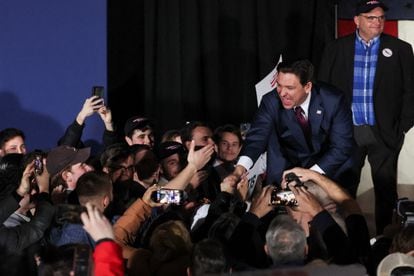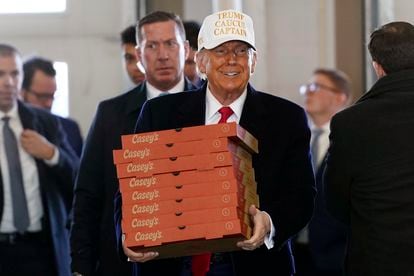“It's always a great day to be a polar bear,” reads a slogan in the hallways of North High School in Des Moines, Iowa. The Polar Bears are the sports teams at this high school where a group of Republican voters have gathered to choose their candidate for the November presidential election. It's 21 degrees below zero outside and there are mountains of snow. It's a good day to be a polar bear, no doubt, but it's also a good day to be Donald Trump. As anticipated by the polls, the former president has swept the Iowa caucuses, including the one at North High School, with a record win.
Trump was the most voted candidate in the hundreds of caucuses that took place on Monday in Iowa, the start of the Republican primary race to decide who will compete against Joe Biden at the November 5 presidential election. Trump's victory in icy Iowa, covered with snow and subjected to Arctic temperatures, is only the first step in the primary race, but it is a show of force for the former president, who is accused of 91 charges in four separate cases — a situation that seems to have helped rather than hindered him. In one fell swoop, Trump cleared any doubts about his leadership among the Republican Party rank and file.
Trump's victory was resounding. He has won more votes than all his rivals combined and has won in 98 of Iowa's 99 counties. Television and media data analysts confirmed his victory, including the almost infallible AP, barely half an hour after the caucuses began. His win was greater than that of Republican Bob Dole, who won the 1988 Iowa caucuses by just over 12 points, the record saving for presidential re-election campaigns. According to AP data, with more than 95% of the votes counted, Trump won 51.1% of the vote, followed by Florida Governor Ron DeSantis with 21.2% and former South Carolina governor and former UN ambassador Nikki Haley with 19.1%. Such an advantage has practically knocked out his rivals in the first round.
Trump appeared Monday night at a convention center in Des Moines, the state capital, to celebrate his resounding victory and congratulated his rivals, in a message tinged with sarcasm: “I want to congratulate Ron and Nikki for having a good time together.” DeSantis and Haley have tried to appear pleased with the results, but at best DeSantis is relieved, while Haley is hopeful.
DeSantis beats Haley
The fight for second place was won by DeSantis, who exceeded the polls' expectations. Still, the result is a full-fledged disappointment. Recently, TV news programs have been tracking how his message from him has changed. A few months ago, he was saying, “We're going to win in Iowa,” but a few weeks ago, that changed to “We're going to do well.” The reality is that despite having visited all 99 counties and despite Iowa being a white, conservative and religious state, which DeSantis favors, the governor was still nearly 30 points behind Trump and only narrowly beat Haley. On Monday, he appeared highlighted and thanked his supporters: “In spite of all that they threw at us, everyone against us, we got our ticket punched out of Iowa,” DeSantis told them.

As for Haley, she was hoping to come in second place, and so present herself as the candidate on the rise, particularly since the next stop in the primary race is New Hampshire, where she is polling well. After coming in a close third behind DeSantis, she is still trying to push that narrative, but it sounds less compelling, especially since Trump's lead is huge. “When you look at how well we're doing in New Hampshire and in South Carolina and beyond, I can safely say tonight Iowa made this Republican primary a two-person race,” she said. It sounded like the speech that she had been prepared in case she had come in second.
Entrepreneur Vivek Ramaswamy came in fourth place, with 7.7%% of the vote, while support for Ryan Binkley (pastor-businessman-politician) and Asa Hutchinson (former Arkansas governor) were minimal, below 1%. Ramaswamy announced he is withdrawing from the race and would be throwing his support behind Trump, with whom he will appear at a rally in New Hampshire this week.
The Iowa caucuses took place in hundreds of civic centers, schools, colleges, institutes, sports centers, churches and even private homes across the state, which is home to 3.2 million inhabitants. Sometimes ahead of voting, there are speech and debates, but this is not always the case. In the Republican caucuses, candidates do not need to meet a certain threshold to qualify for delegates.
Inside a caucus
At the North Institute, John Satre was in charge of campaigning for Trump. He told EL PAÍS that this was the second time he has acted as caucus captain. In 2016, curiously, he defended Senator Ted Cruz against Trump, but now he is devoted to the former president. “Trump is what the country needs, he has shown he has common sense,” he argued. Satre made his defense of Trump with near-simultaneous Spanish translation, even though there were hardly any Latino voters in the room.
Irma Fralic, 60, from South Carolina, Nikki Haley's home state, traveled from Pennsylvania to campaign for her. “Nikki can beat Biden. Trump has a very strong base, but it's not enough. Nikki can unite the country, she is conservative, she does not want a big government, she wants a balanced budget,” he explained to EL PAÍS.
Mike Dorwart, 63, lived in Florida before moving to Iowa, and that's partly why he supports Ron DeSantis. “I think he would be good for the country, he's the right person for this time, for his experience of him and for everything,” he said. “One thing that unites all of us Republicans is the desire
to defeat Joe Biden in November.”

The caucus at the North Institute was a disorderly assembly, without a public address system, and several people speaking at once. There were protests about the delayed start and some chaos in the voting process. Just under a hundred Republicans attended. “You can see the effect of the bad weather,” organizers said. The news that Trump swept Iowa reached the high school assembly hall before those present had even begun to vote. A paradox of a democracy broadcast live. Minutes later, the results of the three North High School polling stations were in: Trump won 45 of the 74 votes, 61%. The news was true. DeSantis took 13 votes; Haley, 9, and Ramaswamy, 5.
The DeSantis campaign protested the very early release of the results, arguing it is election interference. AP, which sets the standard in the matter, explained that the initial results from eight counties showed Trump with an unsurmountable lead only half an hour after the time the caucuses were called. The agency explained that unlike states with primaries, in the Iowa caucuses there are no polls and no set time at which all voting ends. Some polling places may finish within minutes, while others may take some time to determine the outcome. The agency said it announces the results when it believes there is no doubt as to the outcome.
Non-democratic caucuses
The Democrats decided not to kick off the primary race in Iowa after the state's controversial caucuses in 2020, which saw long delays in reporting the results. Biden — who performed dismally in Iowa four years ago — has pushed for the race to begin in more diverse states that better represent the Democrat Party and the country. Iowa Democrats agreed to mail-in ballots, with voting open until March. On Monday, Iowa Democrats met to discuss party business, but not to vote.
Officially, the Democrat Party's primary race begins in South Carolina on February 3, and then moves to Nevada. However, the New Hampshire Democratic Party is moving ahead with a Jan. 23 primary that the party's national apparatus says will be invalid.
Sign up for our weekly newsletter to get more English-language news coverage from EL PAÍS USA Edition
#Trump #sweeps #Iowa #caucuses #crucial #victory #outset #Republican #presidential #campaign

